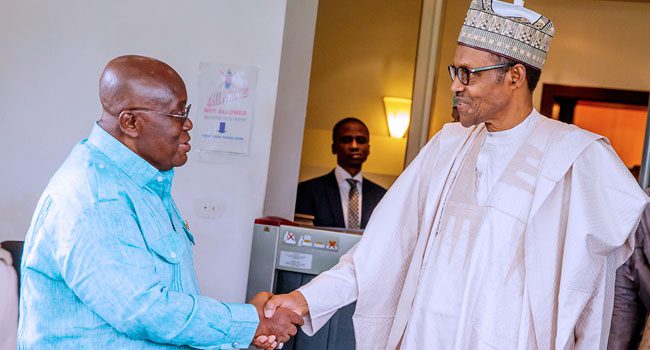Global Issues
39 Years Down The Line, Are Ghanaians Still Brooding Over “Ghana-Must-Go” Palaver? -By Isaac Asabor
The rivalry is such that a Ghanaian football lover would prefer Ghana National Football Team lose a football match to any contesting African national team than losing to Nigeria National Football Team. Paradoxically, the two countries do not even share a common border as they are separated by Togo and Benin but their nationals are always at each other’s throat.

It is not fake to say that two weeks into my arrival in Lagos, years back, in search of the proverbial green pasture that the first friendship I made was with a Ghanaian, Paul Ananfu, also known as Mohammed. By virtue of my relationship with him, I got to know other Ghanaians; both males and females. Unfortunately, the friendship was short-lived as Nigeria in 1983 expelled over two million West African migrants, half of whom were estimated to be from Ghana. Thus, I lost contact with all my Ghanaian friends, including Mohammed, particularly as GSM and Internet technologies have not evolved then.
Be that as it may, one may not be wrong in this context to conjecture that contemporary Ghanaians are seemingly transferring the aggression of what their forebears suffered in an era that is symbolically referred to as “Ghana Must Go” whereas the move was not primarily targeted at Ghanaians per se but to entire West African migrants that were illegally staying in Nigeria at the time. Thus, it was primarily a diplomatic issue.
At this juncture, it is expedient to throw insight to what necessitated the move that was embarked upon by the late Alhaji Shehu Shagari in the early months of 1983 when, as the president of Nigeria, ordered the expulsion of several citizens of countries under the Economic Community of West African States (ECOWAS). Before anyone continues to see the move to be unbrotherly and wicked, it is expedient to also come to terms with the fact that many of our African brothers and sisters at the time had entered Nigeria as economic migrants without official immigration documents. In the case of Ghanaians, both skilled and unskilled migrants were pushed by the unbearable economic conditions in their country to seek refuge in Nigeria, which was widely known as West Africa’s economic hub at the time.
Without being braggadocious about Nigeria’s wealth at the time and its attraction to migrants from Ghana, it is expedient to say that being an oil-rich country, that she was enjoying the benefits of elevated oil prices during the 1970s. With the oil boom came a growth in job opportunities, especially in the services and construction sectors. The notable increase in job opportunities in Nigeria at the time, as well as the existing similarities between the Ghanaian and Nigerian administrative systems, appealed to Ghanaians; prompting their relocation to Nigeria in search of better lives. Upon relocating to Nigeria, the Ghanaians worked in different industries as labourers, traders, artisans, teachers, architects, lawyers and doctors among other positions; both attractive and unattractive.
At this juncture, one may not be wrong to say that since the expulsion of Ghanaians from Nigeria that the once brotherly relationship between nationals of both countries have become frozen and livid. In fact, as it is, there has been deep-seated rivalry that has been strongly influencing the relationships between the two countries in such a way that they compete in music, film, education, sports, and even Jollof rice.
The rivalry is such that a Ghanaian football lover would prefer Ghana National Football Team lose a football match to any contesting African national team than losing to Nigeria National Football Team. Paradoxically, the two countries do not even share a common border as they are separated by Togo and Benin but their nationals are always at each other’s throat.
In fact, judging from the depth of rivalry that has being displayed by nationals of both countries; and even the government in some cases, one can dispassionately conclude that the Ghanaians have always been the troublemakers. Since illegal immigrants among them were evicted from Nigeria in 1983, it appears the norm is to attack any Nigerian that lives in Ghana ostensibly as a form of retaliation. Aptly put, they see every Nigerian in Ghana as a criminal and unwanted. Now, the question which is invariably the title of this piece is: 39 years down the Line, are Ghanaians still brooding over “Ghana-Must-Go” Palaver?
Against the foregoing backdrop, it is expedient to refer some readers who might have considered the title of this piece to be inappropriate and confrontational to few unfriendly incidents that have over the years transpired between both countries.
For instance, despite the provisions of the ECOWAS protocols, Ghana’s use of its Ghana Investment Promotion Centre (GIPC) Act 865, Section 27 (1a) of 2013 against Nigerian businessmen in Ghana flouts the provisions on rules of engagement. In fact, the predicament of Nigerian traders at a time became an issue of debate nationally and within the West Africa sub-region. This was due to the controversial GIPC’s $1 million levy that mandated every foreign investor in Ghana to either provide the huge sum in cash or as raw materials before legally being recognized to do business in the country.
In a similar vein, the attitude of the Ghana Union of Traders Association (GUTA) towards Ghana-Nigeria Friendship Act, which could ease restrictions on Nigerians within the trade sector in Ghana speaks eloquence.
It would be recalled that the Speaker of Parliament, Alban Bagbin at a meeting with GUTA’s president, Dr. Joseph Obeng, said easing restrictions for Nigerians will kill Ghanaian traders.
“If they (Nigerians) are coming to stay here, take our markets and all that, then we are dead,” Dr. Obeng stressed.
“If you open your doors to them, we will be swallowed. Even now they have taken all our space. We cannot simply compete with them.”
To someone that is in doubt of the frozen relationships between Ghana and Nigeria, the foregoing comments are explanatory and informative enough.
As if the insults, rejections and humiliations Nigerians have been receiving from Ghanaians, unarguably in retaliation of “Ghana-Must-Go” palaver, Shatta Wale, a Ghanaian dancehall artiste on December 25, 2021 during a show tagged Freedom Concert addressed his naysayers, who he invariably deemed to be Nigerian artistes. Speaking to his fans at the show, he ranted, “They told me that I won’t be able to fill my stadium. I don’t look up to any stupid Nigeria artiste I look up to my fans. Fuck Nigeria”.
To my view, I think 39 years is too long for Ghanaians to be brooding over “Ghana-Must-Go” Palaver. They should also not forget how Nigerians helped them by accommodating them to survive when they were faced with biting economic recession. That the government decided to send them packing has nothing to do with Nigerians that were not in government.

















